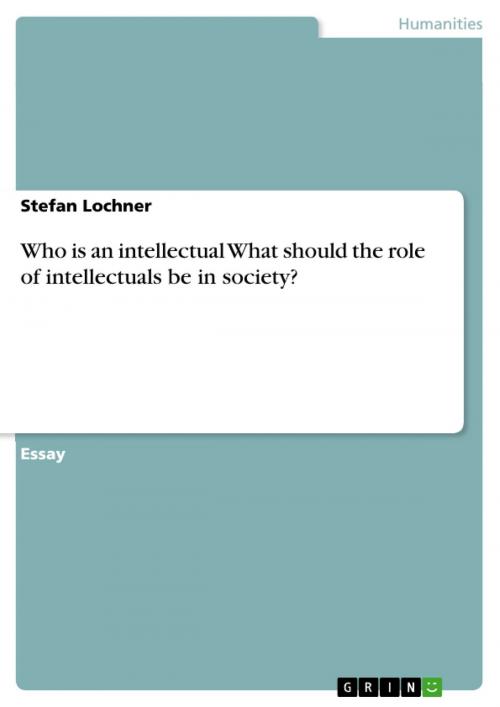Who is an intellectual What should the role of intellectuals be in society?
Nonfiction, Social & Cultural Studies, Social Science, Sociology| Author: | Stefan Lochner | ISBN: | 9783656033929 |
| Publisher: | GRIN Publishing | Publication: | October 21, 2011 |
| Imprint: | GRIN Publishing | Language: | English |
| Author: | Stefan Lochner |
| ISBN: | 9783656033929 |
| Publisher: | GRIN Publishing |
| Publication: | October 21, 2011 |
| Imprint: | GRIN Publishing |
| Language: | English |
Essay from the year 2004 in the subject Sociology - Political Sociology, Majorities, Minorities, grade: G, Credits 6, University of Dalarna, language: English, abstract: It is very difficult to give a proper and precise definition of the social group or milieu of intellectuals because of its heterogenity and non-unity. Which should be the criteria and structure similarities that determine the definition? Is it possible to summarize all categories and types within a definition? Many perspectives exist concerning what an intellectual is and of course what his role or function in the society already is or should be, they all depend on different contexts or thematic fields and deviating focuses. Based on this variety I would define the explanandum according to the concept of the Weberian ideal type. In this case we should find universal categories which could stand for every object we can call 'intellectual' in every time and every place, without moral, ethic or functional intentions. To my opinion intellectuals are a minority who have - due to their public/private education or natural talent - an above average expert knowledge or mind and consequently further reaching and profound realizations or specific ideas which are used to produce cultural goods in the broadest way of the word's meaning. This includes for example scientists, authors, journalists, artists, composers, musicians, directors, priests and so on. So we have only three characteristic categories, by the may this makes them in comparison to other social groups - only in a quantitative point of view - a minority: An above average expert knowledge or mind, because of these realizations or ideas of a higher order which are finally transformed and materialized in speech, books, music, films, paintings or sculptures. Let us shortly closer light up these categories, for example in the social system of art, especially the modern art, as one subsystem of the cultural system. Some of the cultural products and with it the specific ideas, realizations and intentions have reached a point that they are for the average citizens, very difficult to understand or to interpret because of a lack of knowledge and mind in this special field. The cultural goods of the subsystem art as the so far final products of development and differentiation can therefore only in the first line really be understood by intellectuals with their special knowledge within this system that is separated from the outside.
Essay from the year 2004 in the subject Sociology - Political Sociology, Majorities, Minorities, grade: G, Credits 6, University of Dalarna, language: English, abstract: It is very difficult to give a proper and precise definition of the social group or milieu of intellectuals because of its heterogenity and non-unity. Which should be the criteria and structure similarities that determine the definition? Is it possible to summarize all categories and types within a definition? Many perspectives exist concerning what an intellectual is and of course what his role or function in the society already is or should be, they all depend on different contexts or thematic fields and deviating focuses. Based on this variety I would define the explanandum according to the concept of the Weberian ideal type. In this case we should find universal categories which could stand for every object we can call 'intellectual' in every time and every place, without moral, ethic or functional intentions. To my opinion intellectuals are a minority who have - due to their public/private education or natural talent - an above average expert knowledge or mind and consequently further reaching and profound realizations or specific ideas which are used to produce cultural goods in the broadest way of the word's meaning. This includes for example scientists, authors, journalists, artists, composers, musicians, directors, priests and so on. So we have only three characteristic categories, by the may this makes them in comparison to other social groups - only in a quantitative point of view - a minority: An above average expert knowledge or mind, because of these realizations or ideas of a higher order which are finally transformed and materialized in speech, books, music, films, paintings or sculptures. Let us shortly closer light up these categories, for example in the social system of art, especially the modern art, as one subsystem of the cultural system. Some of the cultural products and with it the specific ideas, realizations and intentions have reached a point that they are for the average citizens, very difficult to understand or to interpret because of a lack of knowledge and mind in this special field. The cultural goods of the subsystem art as the so far final products of development and differentiation can therefore only in the first line really be understood by intellectuals with their special knowledge within this system that is separated from the outside.















